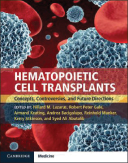BOOKMARK
Title: Hematopoietic Cell Transplants: Concepts, Controversies, and Future Directions
Editors: Hillard M. Lazarus, MD; Robert Peter Gale, MD, PhD, DSc (hon), FACP; Armand Keating, MD, FRCP(C); Andrea Bacigalupo, MD; Reinhold Munker, MD; Kerry Atkinson, MBBS, MD, DTM&H, FRCP, FRACP; and Syed Ali Abutalib, MD
Publisher: Cambridge University Press
Publication Date: July 2017
Price: $240.00, hardcover; 736 pages

Staying abreast of data and knowledge (two distinctly different activities) in a constantly evolving field like hematopoietic cell transplantation is challenging. Most practitioners attend medical conferences and have subscriptions, often electronic, to transplant-oriented medical journals. So what is the role of a textbook in 2018? Isn’t it out-of-date the moment it’s published? Do we need another textbook in such a rarified field?
First, hematopoietic cell transplants are less esoteric than one might think. Over 1 million have been done worldwide, and the pace is increasing. Second, books in print may be a challenged medium, but the format is not yet dead (although possibly on life support). And we should not forget the major role books have played in influencing people and reshaping the world.
Focus on Provocative Issues
Hematopoietic Cell Transplants: Concepts, Controversies, and Future Directions is a detailed account of the field today and what its future looks like. The 7 editors—from diverse backgrounds but in one way or another touching on transplants—have assembled contributions from 150 experts into 72 chapters covering every aspect of hematopoietic cell transplantation you might imagine and several you might not.
Although the content will probably not change current practices, it will likely have a great influence on many readers by focusing more on controversies than boiler-plate subject matter.—
Tweet this quote
The authors were encouraged to present the basic concepts and controversies with an eye toward future directions and developments. Although the content will probably not change current practices, it will likely have a great influence on many readers by focusing more on controversies than boiler-plate subject matter.
By emphasizing provocative issues, the book avoids being a classic. There are several reasons why not being a classic is an advantage in the digital age. The most obvious is timeliness. We no longer need textbooks for facts; we need them to help untangle seemingly contrary data and controversies. (A psychiatrist and/or a magician, sometimes both, can also help.)
A second advantage is this book gives us a blueprint for what could be the future of hematopoietic cell transplants. Finally, there is an inherent advantage to not being a classic: As Mark Twain noted, a classic is “a book which people praise and don’t read.”
Obvious Competitor
One cannot avoid comparing Hematopoietic Cell Transplants: Concepts, Controversies, and Future Directions with its obvious competitor: Thomas’ Hematopoietic Cell Transplantation, currently in its fifth edition. The books are rather different. Which one to buy?
Thomas’ Hematopoietic Cell Transplantation is, for better or worse, a classic (and an admirable one). Like the Bible in a hotel, every transplant center needs one on its shelf. Precisely who will read it is unclear, but it is certainly a trusted, reliable source of accurate information and maybe a good doorstop on a windy day. Hematopoietic Cell Transplants: Concepts, Controversies, and Future Directions, on the other hand, is livelier and much more focused on the future than the past or present.
If I had to choose between them I would let age be my guide. Are you older than 55 years? If so, Thomas’ Hematopoietic Cell Transplantation is likely what you want. But if you are younger, it’s Hematopoietic Cell Transplants: Concepts, Controversies, and Future Directions. Like you, it will have a much longer lifespan—unless you have an aggressively flapping door! ■
Dr. Hashmi is an internist and hematologist in the Bone Marrow Transplant Program, Mayo Clinic, Rochester, Minnesota, and in the Department of Adult Hematology/Stem Cell Transplant at King Faisal Specialist Hospital and Research Centre, Riyadh, Saudi Arabia.

